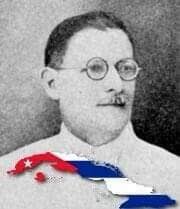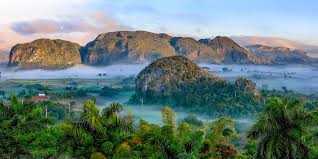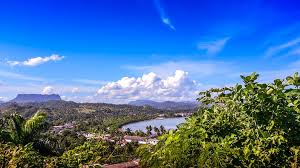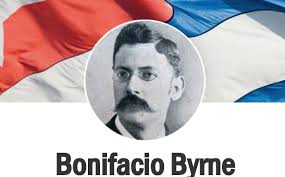 BONIFACIO BYRNE: “EL POETA DE LA BANDERA CUBANA”. VIDEOS/PHOTOS.
BONIFACIO BYRNE: “EL POETA DE LA BANDERA CUBANA”. VIDEOS/PHOTOS.
Traer a Bonifacio Byrne al siglo XXI, develarlo ante las nuevas generaciones que lo desconocen y redescubrirlo a las que supieron de él, aunque de manera poco profunda, es un acto de justicia poética e histórica para con este hombre que, nacido en Matanzas en 1861 y que creció escuchando —y admirando— remembranzas épicas de la Guerra del 68 y perteneció con Julián del Casal, a una de las hornadas de bardos finiseculares.
No le fue ajeno el fragor efervescente de la época en que vivió su temprana juventud y su aura poética halló cobija con más fuerza en los aconteceres patrios que se debatían en la lucha por la independencia de la Nación, como tampoco se evadiría más tarde de la realidad cubana cuando Estados Unidos le arrebató su independencia a la isla para sumirla en la ignominiosa etapa de la Enmienda Platt.
Poema “Mi Bandera”.
El también llamado ‘Poeta de la Guerra’ se vio obligado en 1896 a emigrar a Tampa, Florida, como tantos de nosotros, para actuar allí tan dignamente como lo hicieran los cubanos radicados en esa ciudad de Norteamérica que querían la libertad de Cuba. Las razones por las que hubo de partir para huir de las persecuciones del gobierno se asocian al fusilamiento de su amigo, el revolucionario Domingo Mujica. A raíz de este hecho empieza a circular un soneto en el que se enaltecía la valentía con que enfrentó la víctima su muerte. Y aun sin estar firmado todos reconocían en esos versos a Byrne como su legítimo autor.
Efigies se titula el poemario donde incluirá los sonetos patrióticos que publica en Filadelfia, en 1897, cuyos versos exaltan figuras y hechos trascendentales de la gesta independentista cubana y cuyas remuneraciones tendrán como fin incrementar los fondos destinados por los revolucionarios a la causa liberadora.
“De distantes riveras” hasta su tierra amada, regresará este poeta del que se dice que no pudo pasar un solo día de su vida sin escribir un poema, en 1899, apenas finalizada la guerra. Al acercarse a suelo cubano, Byrne pudo distinguir al lado de su enseña nacional la norteamericana, que entonces indicaba la indeseada presencia de ese país en el suyo, y la inspiración, agitada por el doloroso cuadro que contemplaba, lo hizo componer ese poema que no puede leerse ni escucharse sin emoción y que todo cubano cabal siente como suyo: Mi bandera.
Nunca el pabellón tricolor ondeó tan dignamente en unos versos. Nunca la palabra del poeta fue más altiva para erigir la soberanía de la patria.
Había nacido el poema de la bandera. Bonifacio Byrne, quien se abrió en sus albores a la poesía modernista con aquel libro que llamó Excéntricas, torcía su motivación hacia otras preocupaciones y les legaba esta joya literaria y espiritual a sus coterráneos.
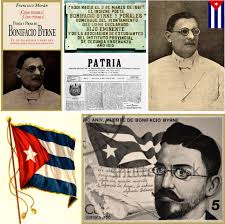 BONIFACIO BYRNE: “THE POET OF THE CUBAN FLAG”. VIDEOS / PHOTOS.
BONIFACIO BYRNE: “THE POET OF THE CUBAN FLAG”. VIDEOS / PHOTOS.
Bringing Bonifacio Byrne into the 21st century, unveiling him before the new generations who do not know him and rediscovering him to those who knew about him, although in a shallow way, is an act of poetic and historical justice for this man who, born in Matanzas in 1861 and that he grew up listening to — and admiring — epic remembrances of the War of ’68 and belonged with Julián del Casal, to one of the turn of the century bards.
The effervescent din of the time in which he lived his early youth was not alien to him and his poetic aura found shelter with more force in the national events that were debated in the fight for the independence of the Nation, nor would it later evade the Cuban reality when the United States seized its independence from the island to plunge it into the ignominious stage of the Platt Amendment.
The so-called ‘Poet of War’ was forced in 1896 to emigrate to Tampa, Florida, like so many of us, to act there as worthily as did the Cubans living in that North American city who wanted the freedom of Cuba. The reasons why he had to leave to escape government persecution are associated with the execution of his friend, the revolutionary Domingo Mujica. As a result of this fact, a sonnet begins to circulate in which the courage with which the victim faced his death was praised. And even without being signed, everyone recognized Byrne as their legitimate author in those verses.
Poem “My Flag”.
Effigies is the title of the collection of poems where it will include the patriotic sonnets that he published in Philadelphia in 1897, whose verses exalt figures and transcendental events of the Cuban independence struggle and whose remuneration will be to increase the funds allocated by the revolutionaries to the liberating cause.
“From distant shores” to his beloved land, this poet will return, it is said that he could not spend a single day of his life without writing a poem, in 1899, just after the war. As he approached Cuban soil, Byrne was able to distinguish the American one next to his national ensign, which at the time indicated the unwanted presence of that country in his, and inspiration, agitated by the painful picture he was contemplating, made him compose that poem that did not It can be read or heard without emotion and that every true Cuban feels as his own: My flag.
Never has the tricolor flag waved so gracefully in a few verses. Never the word of the poet was more haughty to erect the sovereignty of the country.
The flag poem was born. Bonifacio Byrne, who at his dawn opened to modernist poetry with that book he called Eccentrics, twisted his motivation towards other concerns and bequeathed this literary and spiritual jewel to his countrymen.
Agencies/ Radio Encyclp./ Extractos/ Excerpts/ Internet Photos/ YouTube/ Arnoldo Varona/ www.TheCubanHistory.com
THE CUBAN HISTORY, HOLLYWOOD.



